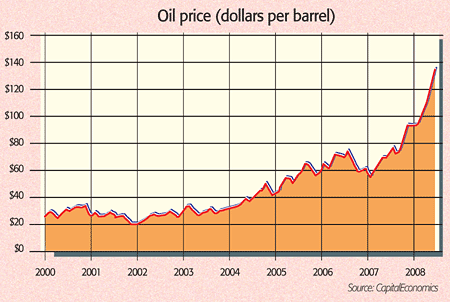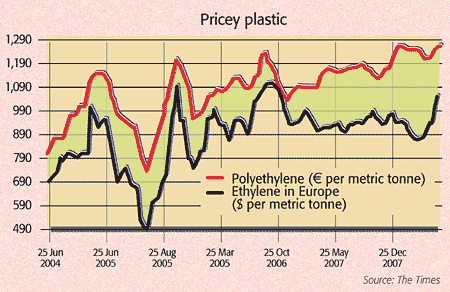Get the latest financial news, insights and expert analysis from our award-winning MoneyWeek team, to help you understand what really matters when it comes to your finances.
You are now subscribed
Your newsletter sign-up was successful
Want to add more newsletters?

Twice daily
MoneyWeek
Get the latest financial news, insights and expert analysis from our award-winning MoneyWeek team, to help you understand what really matters when it comes to your finances.

Four times a week
Look After My Bills
Sign up to our free money-saving newsletter, filled with the latest news and expert advice to help you find the best tips and deals for managing your bills. Start saving today!
Last weekend's widely-watched oil summit in Jeddah turned out to be little more than a talking shop, with scant impact on oil prices. Saudi Arabia, the only oil producer capable of expanding output rapidly, confirmed that it would boost production by 200,000 barrels per day (bpd) a well-trailed figure that fell short of the 500,000 some observers had been hoping for. That takes overall production to 9.7 million bpd, the highest in almost 30 years, and leaves its spare capacity at 1.5 million bpd, the lowest in a generation.
Another problem, as The Economist points out, is that much of its new output is in the form of heavier oil that is more expensive to refine, and for which there is less demand. And recent losses from Nigerian production "wipe out" any fresh oil offered by the Saudis, says Robert Laughlin of MF Global. Nigerian production has slumped to a 25-year low of 1.5 million bpd, around one million barrels below its usual capacity. Sabre-rattling by Iran and Israel also helped send oil prices back towards last week's record of $139 a barrel early this week.

Still, by pressing on with price liberalisation, China has signalled that consumers will have to bear more of the cost of fuel, says Capital Economics. "Ever-accelerating demand for commodities cannot be taken for granted." The extent of the price jump "suggests some softening of oil demand growth is likely", reckons Helen Henton of Standard Chartered.
MoneyWeek
Subscribe to MoneyWeek today and get your first six magazine issues absolutely FREE

Sign up to Money Morning
Don't miss the latest investment and personal finances news, market analysis, plus money-saving tips with our free twice-daily newsletter
Don't miss the latest investment and personal finances news, market analysis, plus money-saving tips with our free twice-daily newsletter
Other Asian countries have also allowed fixed fuel costs to rise of late. As countries subsidising fuel account for all of current demand growth (China comprised 32% of global consumption growth last year), gradually allowing fuel to reflect market conditions is expected to lower demand and oil prices over the longer term, says Carola Hoyos in the FT.
Meanwhile, as Andrew Bary points out in Barron's, it's "impossible" to gauge the impact of speculative positions and commodity index funds, as most trading happens in over-the-counter transactions, away from the major commodity exchanges. "No doubt" there is "speculative froth" in the market, but it isn't possible to prove if it is contributing $5 or $50 to the price, says Julian Jessop of Capital Economics.
However, it's certain that there will be a "rush for the exits" when oil tops out, says Martin Spring in his OnTarget newsletter. Note that world demand growth is forecast to fall to 0.9% this year and it is likely to be "significantly less" next year as the credit crunch-induced slowdown deepens and possibly ends in recession.
A major issue in this context is that the developing world's especially Asia's efforts to crack down on inflation presage a slowdown, and possibly a sharp one, in the region. That in turn implies a drop in demand for commodities, which would send prices "tumbling", says Bill Emmott in the Evening Standard.
So while there may be further spikes in the short term, Spring's prediction that "late this year or early next, oil is likely to fall from current levels" looks reasonable. Nonetheless, given ongoing problems on the supply side, he says, "I'll be surprised if crude goes below $90 a barrel".
The big picture: soaring oil means dearer plastic bags

Ethylene, a gaseous by-product of crude oil refining and the raw material for plastic bottles and bags, is on the rise, as is polyethylene, the most common plastic. Dow Chemicals has just announced the second round of price hikes in a month; Saudi Arabia's SABIC will raise its polyethylene prices by €200 a ton from July.
Get the latest financial news, insights and expert analysis from our award-winning MoneyWeek team, to help you understand what really matters when it comes to your finances.
MoneyWeek is written by a team of experienced and award-winning journalists, plus expert columnists. As well as daily digital news and features, MoneyWeek also publishes a weekly magazine, covering investing and personal finance. From share tips, pensions, gold to practical investment tips - we provide a round-up to help you make money and keep it.
-
 Average UK house price reaches £300,000 for first time, Halifax says
Average UK house price reaches £300,000 for first time, Halifax saysWhile the average house price has topped £300k, regional disparities still remain, Halifax finds.
-
 Barings Emerging Europe trust bounces back from Russia woes
Barings Emerging Europe trust bounces back from Russia woesBarings Emerging Europe trust has added the Middle East and Africa to its mandate, delivering a strong recovery, says Max King

